Juliet Jacques
Juliet Jacques
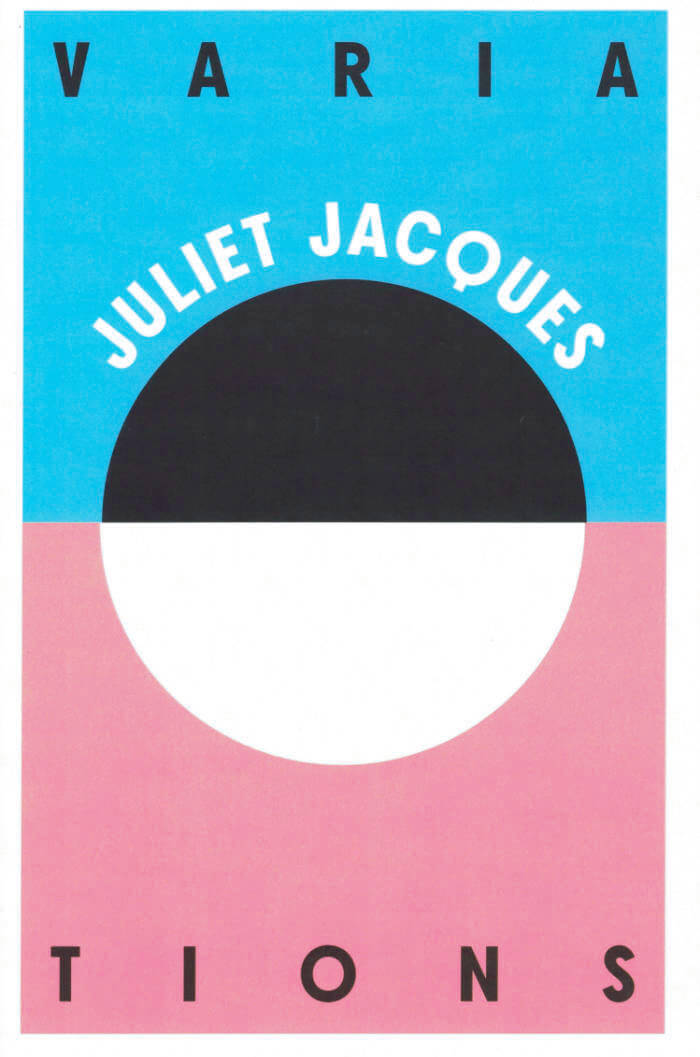
Variations
Variations is the debut short story collection from one of Britain’s most compelling voices, Juliet Jacques. Using fiction inspired by found material and real-life events, Variations explores the history of transgender Britain with lyrical, acerbic wit.
Variations travels from Oscar Wilde’s London to austerity-era Belfast via inter-war Cardiff, a drag bar in Liverpool just after the decriminalisation of homosexuality, Manchester’s protests against Clause 28, and Brighton in the 2000s. Through diary entries of an illicit love affair, an oral history of a contemporary political collective; a 1920s academic paper to a 1990s film script; a 1950s memoir to a series of 2014 blog posts, Jacques rewrites and reinvigorates a history so often relegated to stale police records and sensationalist news headlines.
Innovative and fresh, Variations is a bold and beautiful book of stories unheard; until now.
And more
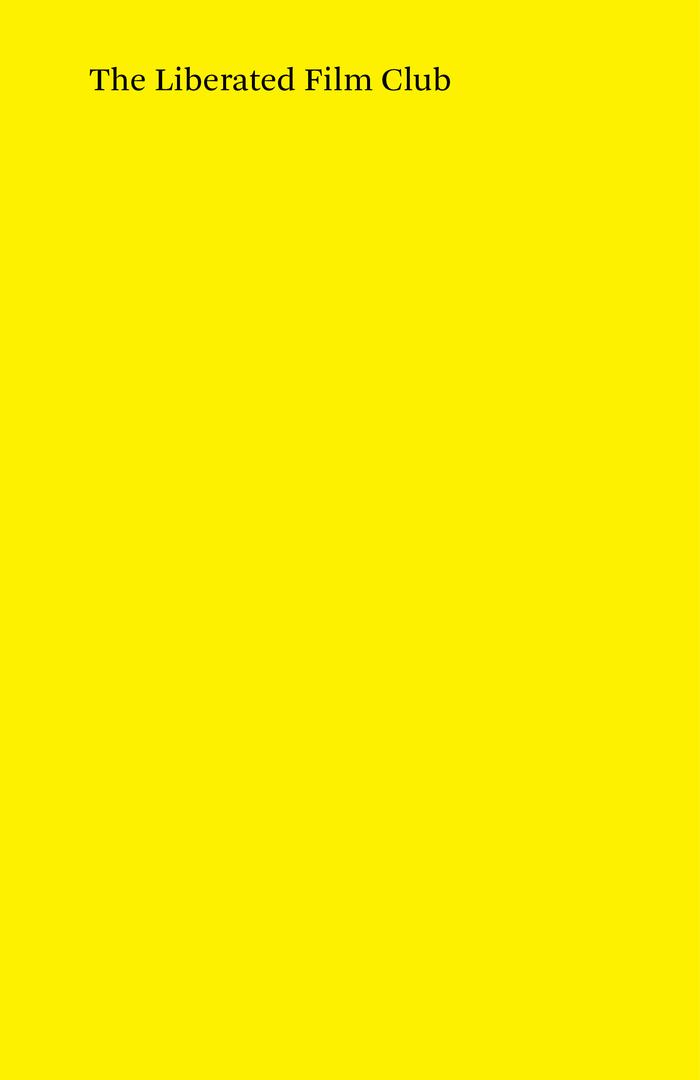
The Liberated Film Club
The Liberated Film Club—running from its birth to its death, 2016 to 2020—would guarantee a wide wing-span for critical conversation. Screening “Liberated film” (a loose category designed to scaffold the show), a guest would be invited to introduce a film; an audience seated to watch it through; but there’d be an interruption to that typical format. Neither the audience nor the guest would have any idea what film would be shown, and this anonymised format would invite broad and antagonistic perambulation on the what, the why and the how of film.
An interrogation of what we do when we sit in a cinema; a reckoning with the kind of posture we should assume when we frame a film for further talk. Playing with the various ways we should consider and reproach the institutions built around all of our cultures of making and the manners and methods of all of our cultures of consumption, the Liberated Film Club was a rare reflection on the act of reflection itself.
An anthology publication,
featuring contributions from
John Akomfrah;
Chloe Aridjis;
Dennis Cooper;
Laura Mulvey;
Chris Petit;
Mania Akbari;
Elena Gorfinkel;
Juliet Jacques;
Ben Rivers;
Dan Fox;
Sean Price Williams;
Adam Christensen;
Stewart Home;
Stephen Watts;
Tony Grisoni;
Gideon Koppel;
Astra Taylor;
Miranda Pennell;
Gareth Evans;
Adam Roberts;
Tai Shani;
Anna Thew;
Xiaolu Guo;
Andrea Luka Zimmerman;
William Fowler;
Athina Tsangari;
John Rogers;
Shama Khanna;
Shezad Dawood;
Damien Sanville;
& Stanley (& Winstanley) Schtinter.
(Eds.) Stanley Schtinter,
with Dominic J. Jaeckle
& Jon Auman
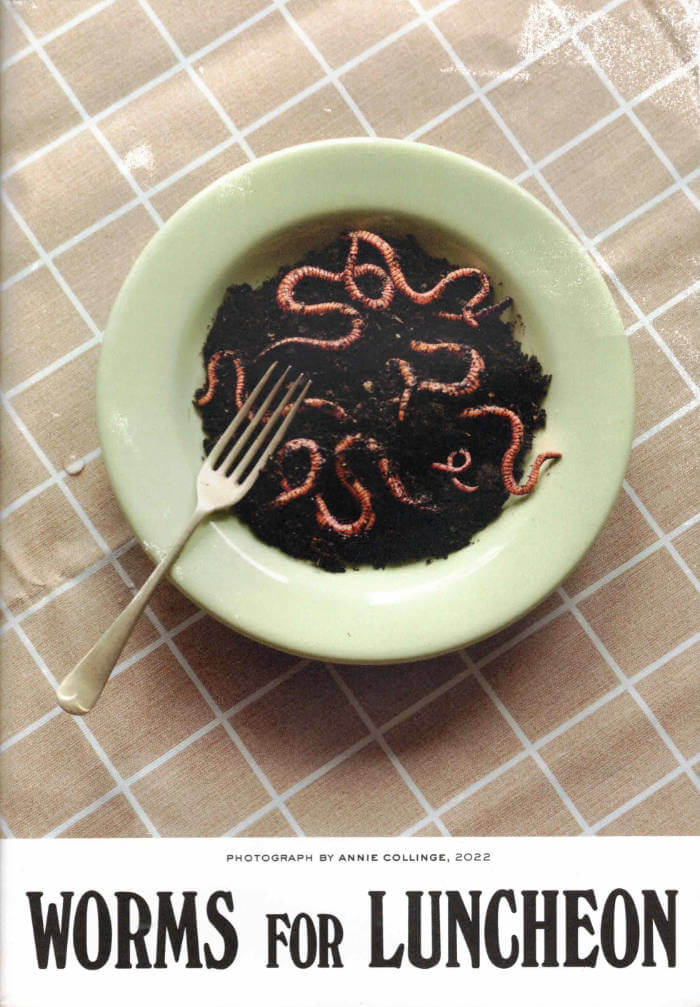
Worms For Luncheon
Worms and Luncheon have come together to bring the tastiest of fertilisers, to accompany your lunch for one. Think of this publication as a wine pairing for bookworms. Each story has been tailored to your taste, with a serving suggestion accompanying each piece. Not to be read in the company of others, and only to be consumed with food.
Featuring contributions from Eileen Myles, Cecilia Pavón, Clem MacLeod, Kate Morgan, Pierce Eldridge, Juliet Jacques, Lynne Tillman, Estelle Hoy, Jodie Hill, Leone Ross, Slutty Cheff, Izdihar Afyouni, Gabriela Aquije and Stephanie LaCava. With photographs by Chieska Fortune Smith.
The 88 page thread bound publication consists of poetry, short stories, personal essays, illustrations and photographs of the cosiest spots to dine alone in.
Concept initiated by Clem MacLeod and France Armstrong Jones
Writing Commissioned by Clem MacLeod
Editors Clem MacLeod, Caitlin McLoughlin, Pierce Eldridge, Arcadia Molinas and Violet Conroy
Cover image by Annie Collinge
Art direction and design by Caitlin McLoughlin and Mariana Sameiro
Illustrations by Clemmie Bache
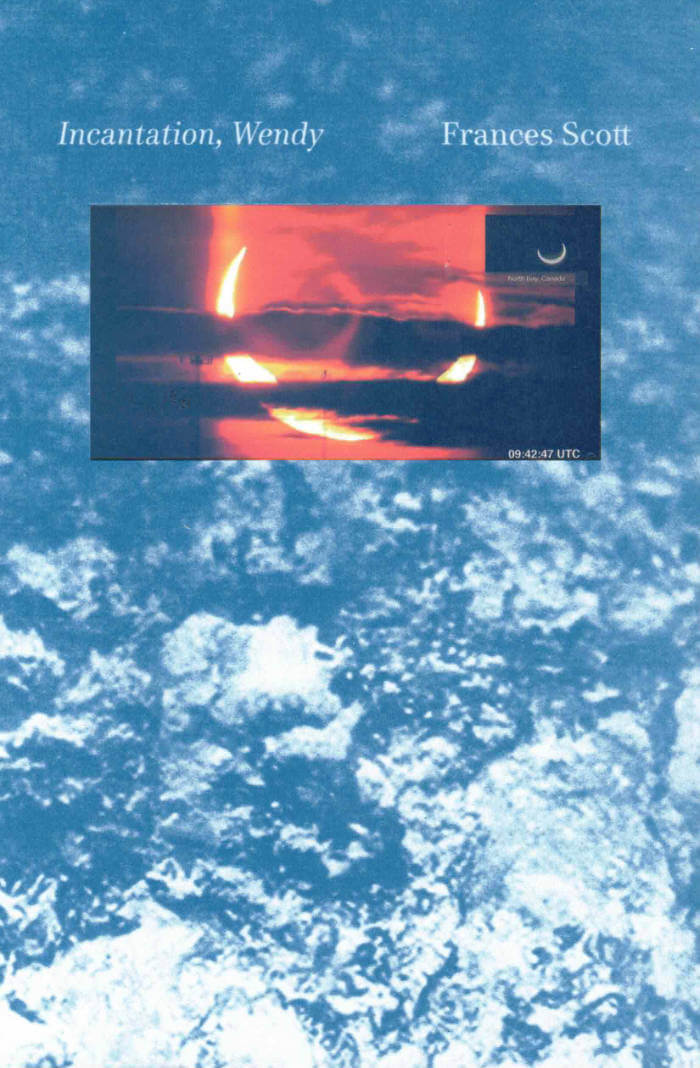
Incantation, Wendy
This book is an incantation for Wendy (2023), a film fan letter from artist Frances Scott to composer Wendy Carlos. Written contributions from Beth Bramich, Stine Hebert, Juliet Jacques, Tom Richards, Chu-Li Shewring and Dave Tompkins are accompanied by hand-drawn music scores, film stills and script notes produced during Scott’s research, and her moving-image work Valentina (2020), a rehearsal to camera with performer Valentina Formenti.
Incantation, Wendy precedes the film Wendy and meditates on Carlos as ‘The Original Synth’, moving across channels that speak of the unbounded voice in collaboration, synthesis and transition; through vocoders, archives, re-readings, light pulses, solar flares and cyclical returns; and in concert with horses, moons and a sun, eclipsing as it rises above the horizon.

BFTK #6: Tentative — Incomplete — Inconsistent
Andrew Walsh‐Lister, Matthew Stuart
This instalment of Bricks from the Kiln doubles as issue #6 of the journal and as an exhibition catalogue for the thematic show ‘BFTK#6: Tentative — Incomplete — Inconsistent: A Catalogue of the Disappeared, Destroyed, Lost or Otherwise Inaccessible’. Presenting objects, artworks, artefacts, models, events and animals that no-longer — or never did — exist in physical form, the exhibition explores themes of death, destruction and reincarnation, examining persisting interests in notions of ephemerality and permanence, memory and record, preservation and erasure, creation and reconstruction.
How do we remember and memorialise? How is space given to the unrecorded? How do we experience the out of reach, concealed, unseen, undiscovered? How can the dematerialised be materialised again, through the mediation of writing, image and sound?
THE ALMOST HORSE
Helen Marten
(inside front / back cover)
‘STILL IN ALL HEARTS, IN ALL BELLIES, IN ALL TOES’:
A BELATED REVIEW OF FESTIVAL DE FORT BOYARD
Matthew Stuart & Andrew Walsh-Lister
(pp.6–8)
EDDYSTONE
Rachael Allen
(pp.11–18)
TO MAKE THE STONE STONY
Emily LaBarge
(pp.21–26)
WHEREFORE AM I NOW?
Lucy Mercer
(pp.29–40)
WESTON: THE TOWN THAT WAS, AND THEN WASN’T
Crystal Bennes
(pp.43–52)
NOTES TO ACCOMPANY VIOLENT INNOCENCE (2019)
Will Harris
(pp.55–64)
GHOST, POCKETS, TRACES, NECESSARY CLOUDS
Matthew Stuart
(pp.66–69)
CONNECTIVITY OF TOUCHING
Ali Na & Mindy Seu in conversation
(pp.71–76)
PEARL
Rose Higham-Stainton
(pp.79–84)
NOTES FROM NEW MEXICO
Jennifer Hodgson
(pp.87–98)
THE MOOG OF AHMEDABAD
Paul Purgas
(pp.101–108)
IN WHICH DECIBELLA ESCAPES AUDITION
Sarah Hayden
(pp.111–122)
D.C.B.: A PARTIAL RETROSPECTIVE
Juliet Jacques
(pp.125–136)
PINBALL REMAINS: ON THE PINBALL ISSUE OF THE SITUATIONIST TIMES
Ellef Prestsæter
(pp.139–150)
TOMB III – CADMIUM (2021)
Gilbert Again
(pp.152–154)
NON-DESCRIPT ANIMAL
David Hering
(pp.157–161)
Cover & Bookmark artwork by Helen Marten
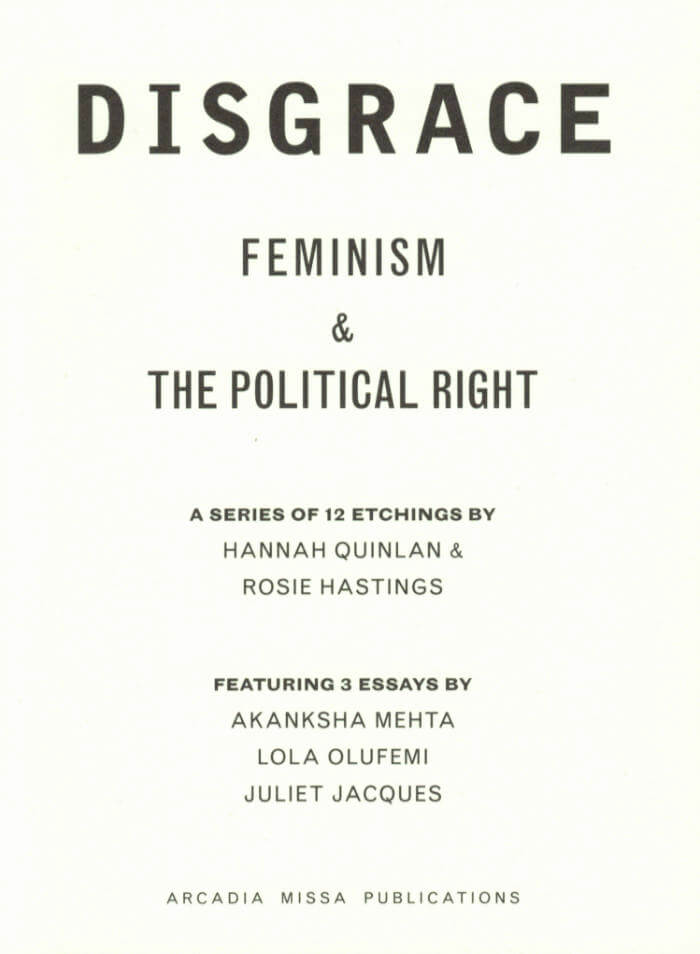
Disgrace: Feminism And The Political Right
Rosie Hastings, Hannah Quinlan
DISGRACE: Feminism and the Political Right explores the history of conservative feminism in the UK from the Edwardian period to today. Expanding on Hannah Quinlan and Rosie Hastings’ research for their eponymous exhibition, the book aims to provide contextual information for the viewer, both as a resource on the history of feminism on the political right and to provide a deeper historical and political insight into the works within the exhibition.
The book centres around a timeline created by 12 etchings, with three essays covering what the artists have identified as three significant time periods, mapping the connections between the various historical manifestations of conservative feminism that lead to the current moment. An essay by Akanksha Mehta, a lecturer in Gender, Sexuality, and Cultural Studies and the co-director of the Centre for Feminist Research at Goldsmiths, considers the nature of the women’s suffrage movement, focusing on the relationship between the suffragettes and eugenics discourse. A polemical text by Lola Olufemi, a black feminist writer and organiser with the London Feminist Library, questions the women’s liberation movement and ‘sex wars’ of the mid 20th century. In the final essay – alongside etchings exploring ‘free-market feminism’, Theresa May’s ‘Women2Win’ campaign and the proliferation of transphobic rhetoric – writer, filmmaker and journalist Juliet Jacques uses Caryl Churchill’s innovative 1982 play ‘Top Girls’ to trace the trajectory of women in power, from Thatcher into the future of feminism.
FEATURING 3 ESSAYS BY:
Akanksha Mehta
Lola Olufemi
Juliet Jacques
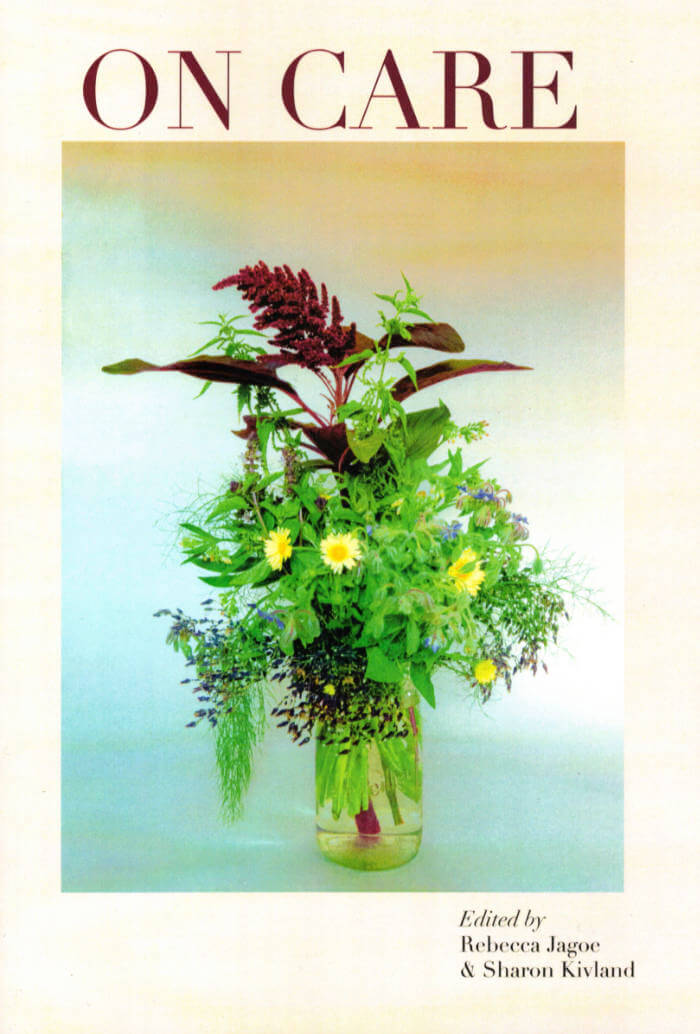
On Care
Care is a matter of responsibility for human and nonhuman allies, an ecological network. Care is an imperative, and acting with care approaches the world beyond selfhood. ON CARE, an aggregate of voices, discusses the politics of caring, support, and the role of welfare in an increasingly neoliberal society. It questions who is seen as worthy of care, whose narratives are given attention, and whose lives are overlooked in a complex web of assemblages: conceptions of medical authority, the co-option of self-care in political rhetoric, care as a commodity in the hospitality industry, intergenerational intimacy, sexecology; care as utopian and care as transactional. ON CARE maps a constellation of perspectives, as testaments, fictions, and essays, addressing the relation between good health, interdependence, and the ethics of (self)care.
Contributors: Tom Allen, Uma Breakdown, Alice Butler, Oisín Byrne, Julia Calver, Jamie Crewe, Juliette Desorgues, Rachel Genn, Laura Godfrey-Isaacs, Laura González, Holly Graham, Helen Hester, Justin Hogg, Juliet Jacques, Mati Jhurry & Rebecca Jagoe, Juliet Johnson, Sophie Jung, Daisy Lafarge, Elisabeth Lebovici, Rebecca Lennon, Rona Lorimer, Katharina Ludwig, Mira Mattar, Martina Mullaney, Cinzia Mutigli, Carolina Ongaro, Molly Palmer, Roy Claire Potter, Nat Raha, Helena Reckitt, Ruiz Stephinson, Erica Scourti, Victoria Sin, Himali Singh Soin & Tyler Rai, Miguel Soto Karlovic, Isabella Streffen, Jamie Sutcliffe, Maija Timonen, Lynn Turner, Rosa-Johan Uddoh, Daniella Valz Gen, Nina Wakeford, Alberta Whittle
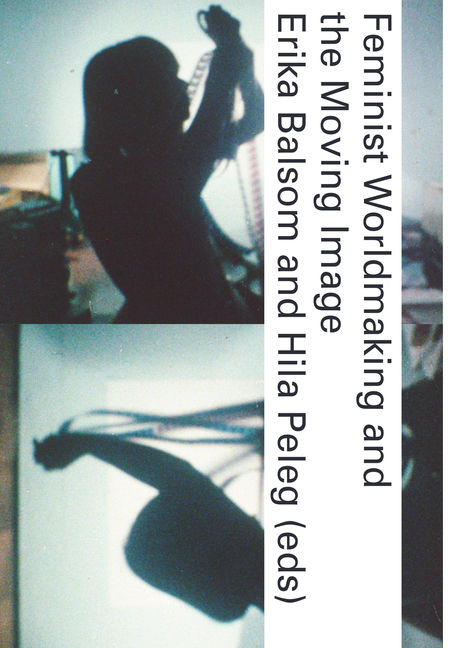
Feminist Worldmaking and the Moving Image
This book offers intersectional, intergenerational, and international perspectives on nonfiction film- and videomaking by and about women, examining practices that range from activist documentaries to avant-garde experiments. Concentrating primarily on the period between the 1970s and 1990s, the contributions revisit major figures, contexts, and debates across a polycentric, global geography. They explore how the moving image has been a crucial terrain of feminist struggle—a way of not only picturing the world but remaking it.
The contributors consider key decolonial filmmakers, including Trinh T. Minh-ha and Sarah Maldoror; explore collectively produced films with ties to women's liberation movements in different countries; and investigate the cinematic expressions of tensions and alliances between feminism and anti-imperialist struggles. They grapple with the need for a broader more inclusive definition of the term "feminism"; meditate on the figure of the grandmother; reflect on realist aesthetics; and ask what a feminist film historiography might look like.
The book, generously illustrated with film stills and other images, many in color, offers ten original texts, two conversations, and eight short essays composed in response to historical texts written by filmmakers. The historical texts, half of which are published in English for the first time, appear alongside the essays.
Contributors
Helena Amiradżibi, Madeleine Bernstorff, Teresa Castro, Counter Encounters (Laura Huertas Millán, Onyeka Igwe, Rachael Rakes), Ayanna Dozier, Forough Farrokhzad, Safi Faye, Devika Girish, Elena Gorfinkel, Haneda Sumiko, Shai Heredia, Juliet Jacques, Sarah Keller, Nzingha Kendall, Julia Lesage, Beatrice Loayza, Janaína Oliveira, Lakshmi Padmanabhan, Yasmina Price, Elizabeth Ramírez-Soto, Pooja Rangan, Lis Rhodes, Sara Saljoughi, Rasha Salti, Isabel Seguí, Chick Strand, Monika Talarczyk, Trinh T. Minh-ha, Françoise Vergès, Claudia von Alemann, Mitsuyo Wada-Marciano, Shilyh Warren, Giovanna Zapperi
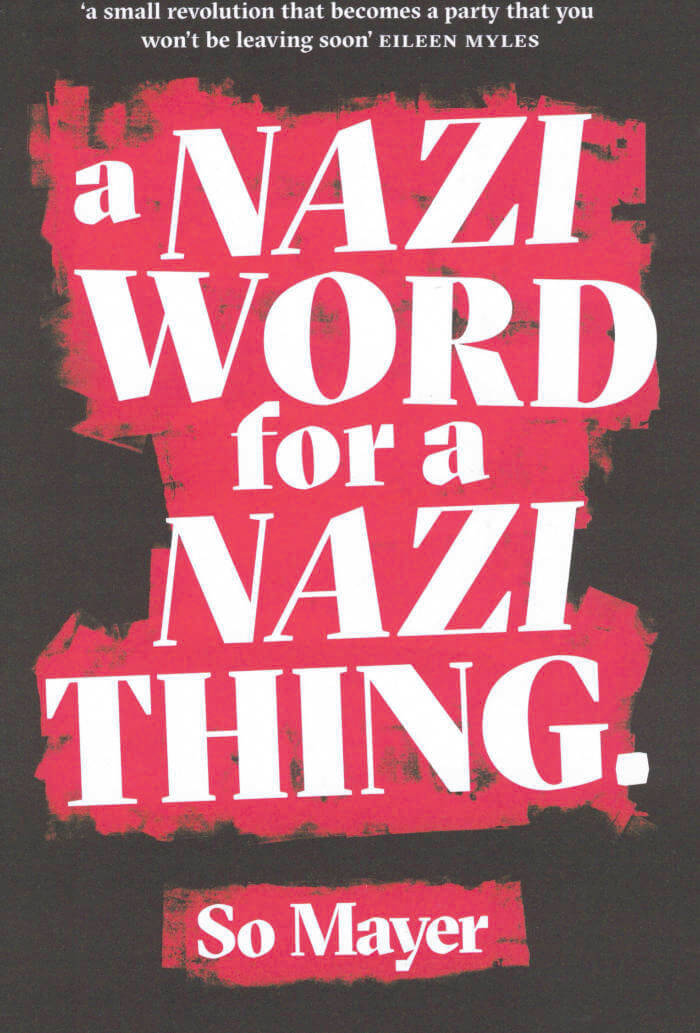
A Nazi Word for a Nazi Thing
An essay on art, bodies and fascism.
In an era where identity politics is being weaponised against the very people it has sought to make visible, how can we reclaim complexity?
In 1937 the Nazis staged an exhibition of seized modernist artworks. Named Entartete ‘Kunst’ – Degenerate ‘Art’ – it sought to define degeneracy, display it and destroy it.This act of violent appropriation is one episode in a long and ongoing history of the erasure of queer and non-normative cultures.
A Nazi Word for a Nazi Thing works against this erasure; it is a manifesto – a catalogue for an exhibition that could never take place. Drawing on work from dissident sexologist Magnus Hirschfeld to South African artist Zanele Muholi, as well as a century of queer cinema from Sergei Eisenstein to Pedro Almodóvar, So Mayer creates an archive of resistance.
‘This book is a small revolution that becomes a party that you won’t be leaving soon. I believe we’re living in a time of fresh erasures, systemic violences working that global pandemic to take some other bodies out. Looking so freshly at the history of queerness, sexual deviance and the long long coordinated erasures of colonialism, bigotry and transphobia the essential non binary nature of art opens up right here like the wildly singing flower it is and So Mayer’s compelling version makes sense, makes me listen.’
— Eileen Myles
‘A Nazi Word for a Nazi Thing is a reflective, creative walk through some of the worst – and best – people of the last hundred years, looking at the power of images and their relationship(s) with text. In a time of rising fascism, So Mayer highlights ways that artists have found strategies of resistance, and offers hope in historical analysis.’
— Juliet Jacques
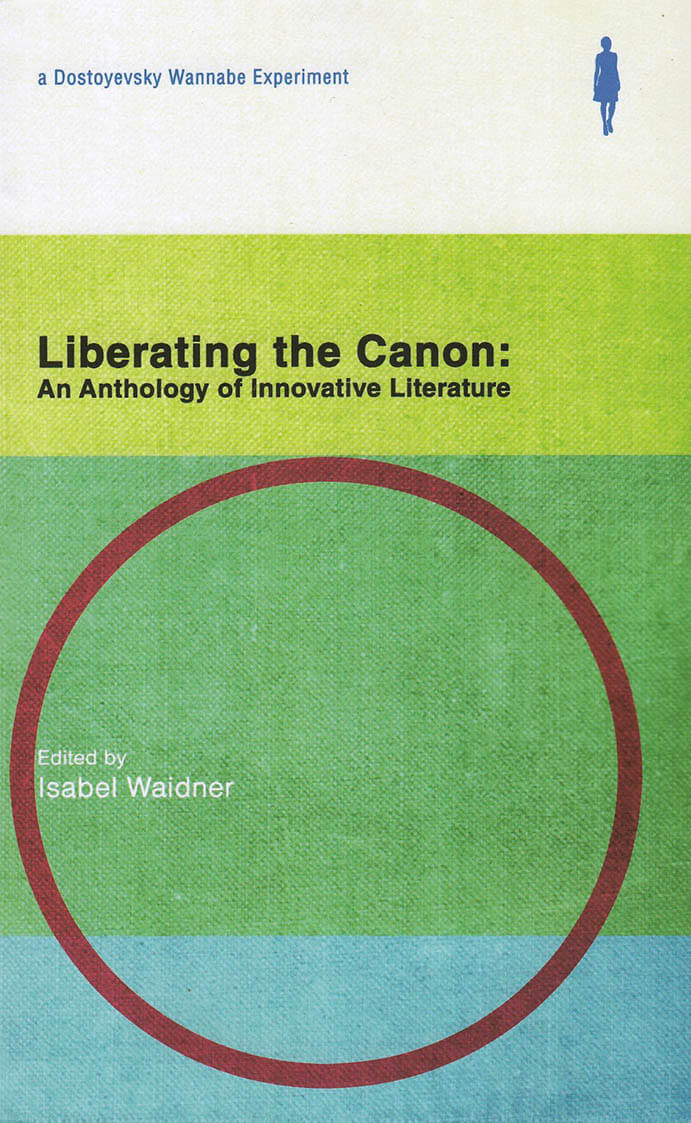
Liberating the Canon
Liberating the Canon is an edited anthology capturing the contemporary emergence of radically innovative and nonconforming forms of literature in the UK and US. Historically, sociopolitical marginalisation and avant-garde aesthetics have not come together in UK literature, counterintuitively divorcing outsider experience and formal innovation. Bringing together intersectional identity and literary innovation, LTC is designed as an intervention against the normativity of literary publishing contexts and the institution 'Innovative Literature' as such. More widely, if literature, any literature, can act as a mode of cultural resistance and help imagine a more progressive politics in Tory Britain and beyond, it is this.
Contributors are Mojisola Adebayo, Jess Arndt (US), Jay Bernard, Richard Brammer, Victoria Brown, SJ Fowler, Juliet Jacques, Sara Jaffe (US), Roz Kaveney, R. Zamora Linmark (US), Mira Mattar, Seabright D.Mortimer, Nat Raha, Nisha Ramayya, Rosie Snajdr, Timothy Thornton, Isabel Waidner, Joanna Walsh and Eley Williams.
Isabel Waidner is a writer and cultural theorist. She is the author of three books of innovative fiction, most recently Gaudy Bauble (Dostoyevsky Wannabe, 2017), which is currently longlisted for the Republic of Consciousness Prize for "hardcore literary fiction and gorgeous prose". Her articles and short fictions have appeared or are forthcoming in journals including 3: AM, Berfrois, Configurations, The Happy Hypocrite, The Quietus and Minor Literature[s]. She is also the editor of Liberating the Canon: An Anthology of Innovative Writing (Dostoyevsky Wannabe, 2018) which explores the relationship between identity, intersectionality and innovation in literature. As part of the indie band Klang, Waidner released records on UK labels Rough Trade (2003) and Blast First (2004). She is a lecturer in English and Creative Writing at Roehampton University, London, UK.

MAL, Nº 1: That Obscure Object
Kathryn Maris, Maria Dimitrova
On desire and its objects in two essays, a short story and three poems. Featuring illustrations by Ana Kirova.
First published November 2018
The inaugural of Mal Journal features an essay by Anne Boyer on infatuation and literary creativity (from Dante's obsession with Beatrice to Chris Kraus's with Dick); an essay by Juliet Jacques on écriture trans-féminine (trans writing as genre); a short story by Saskia Vogel; and poetry by Eileen Myles.